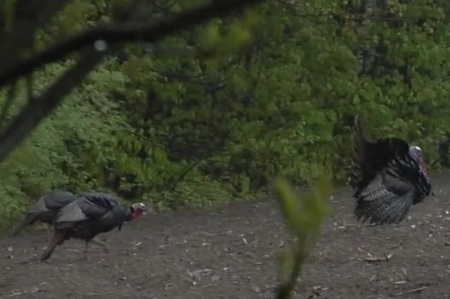 New Hampshire Fish and Game Department: Hunters getting out for New Hampshire’s spring turkey season (May 3-31) can do a lot to help promote positive landowner relations, according to Lindsay Webb, Landowner Relations Coordinator for the New Hampshire Fish and Game Department.
New Hampshire Fish and Game Department: Hunters getting out for New Hampshire’s spring turkey season (May 3-31) can do a lot to help promote positive landowner relations, according to Lindsay Webb, Landowner Relations Coordinator for the New Hampshire Fish and Game Department.
“Remember that access to private land is a privilege provided through the generosity of the landowner,” said Webb. “With more than 70% of New Hampshire’s land in private ownership, practicing good landowner relations is key to maintaining access to private land for future generations.”
Here are some tips:
- Even if you had landowner permission to hunt during the fall, check back in with landowners to discuss the spring hunting season dates and to make sure nothing has changed over the winter.
- Demonstrate good landowner relations in front of youth before, during, and after youth turkey-hunting weekend, April 28 and 29. Ask permission and follow landowner requests.
- Remember that you are the guest of the landowner. Treat their property with the same care and respect that you would if it were your own.
- Never park on lawns, block driveways, roadways, trails, crossings, or gates. Leave all gates and barriers as you found them.
- Written landowner permission is needed to drive an OHRV on private property. If granted permission, understand clearly where you can and cannot drive and carry that permission on your person.
- Become familiar with boundaries of the land you have permission to hunt, surrounding properties, recreation areas, farms, and active logging operations.
- Do not hunt near buildings, livestock, active logging operations, or hiking trails.
- Always ask landowner permission if you plan to construct a ground blind. Written permission is required if your blind will damage a tree or result in cutting of tree branches.
- Make an effort to express your appreciation to the landowner. Follow up with a note of thanks, a small token of appreciation, or offer up assistance with a task or chore. Your ongoing communication with landowners makes a world of difference.
The Turkey Hunter Landowner Relations Project was developed as a partnership between the New Hampshire Fish and Game Department’s Landowner Relations Program and the New Hampshire Chapter of the National Wild Turkey Federation. The focus of the project is to maintain and increase turkey hunter access on private lands. Working in partnership with the Landowner Relations Program, turkey hunters work with landowners to proactively address any issues and concerns that are related to turkey hunting.
For more information about spring turkey hunting: www.huntnh.com/hunting/turkey.html.
For more information about NHFG’s Landowner Relations Program: www.wildnh.com/landshare.
- Never stalk a turkey. It rarely works and increases the risk of an accident.
- Never wear red, white or blue or black over- or under-clothing, because these are the prominent colors of displaying gobblers.
- Never call from a tree that is thinner than the width of your shoulders. Small trees won’t hide slight movements of your hands or shoulders, which might look like a turkey to another hunter.
- Never jump or turn suddenly in response to a suspected turkey. When turkey hunting, assume that every sound you hear is made by another hunter.
- Never call from a site where you can’t see at least 40 yards in all directions.
- Never imitate a gobbler call while concealed in a stand.
- Never presume that what you hear or what responds to your call is a turkey.
- Never think that your camouflage makes you totally invisible. To ID yourself to other hunters, wrap an orange band around a tree.
- Never hide so well that you can’t see what’s happening around you.
- Never move or wave to alert approaching hunters; shout “stop” instead.
